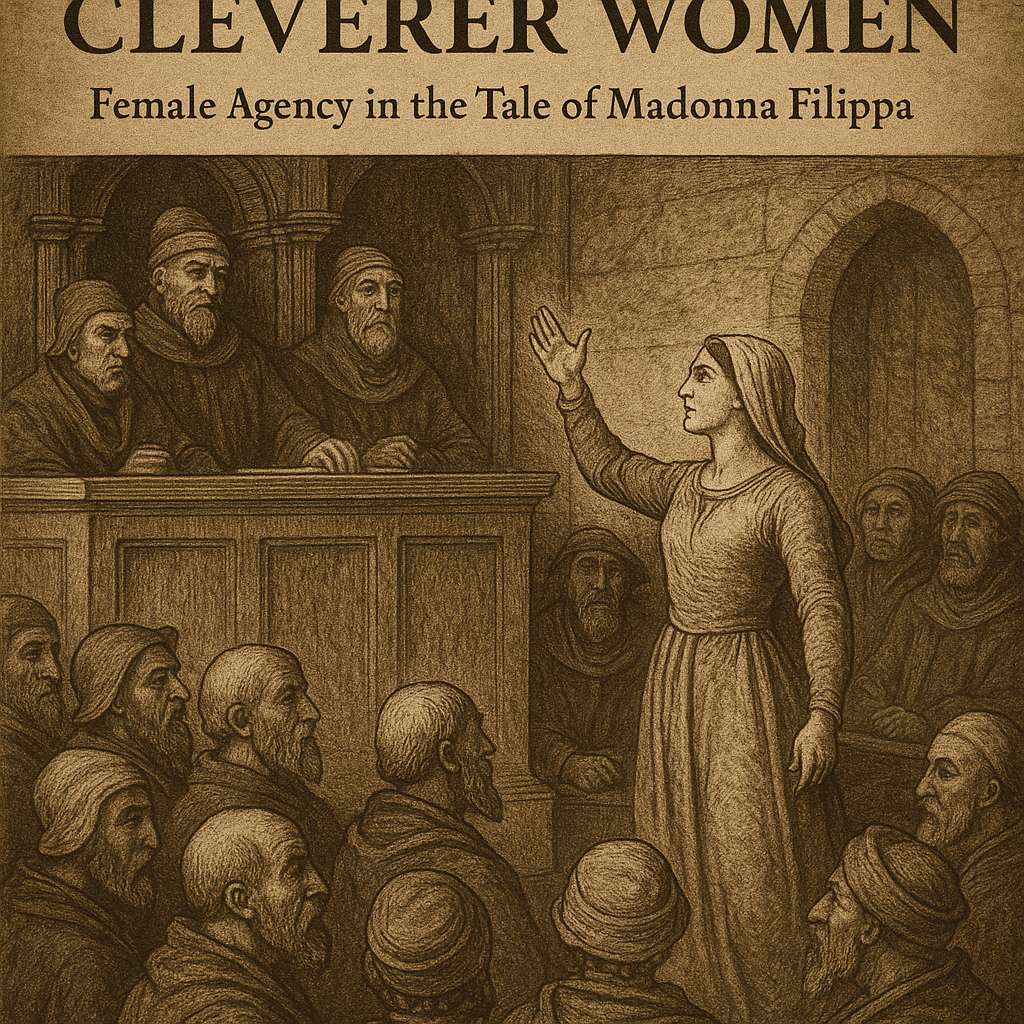Clever Words, Cleverer Women: Female Agency in the Tale of Madonna Filippa

Introduction
In a world where women have often been expected to stay silent, it’s both empowering and refreshing to read about someone who dared to speak up, and did so brilliantly. Madonna Filippa’s story, tucked within Giovanni Boccaccio’s The Decameron, is more than a tale of courtroom drama; it’s a moment in literature where reason, wit, and courage triumphed over unfair laws. She wasn’t born into power, didn’t lead a revolution, and wasn’t trying to change the world. She simply stood her ground and spoke with honesty and intelligence, and in doing so, she shook the system.
Summary
Set in medieval Italy, where the legal system heavily favored men and punished women harshly, Madonna Filippa is accused of committing adultery, an offense punishable by death. Her accuser is none other than her own husband, who brings the case to court. Most people expected Filippa to plead for mercy or hang her head in shame. Instead, she does something unexpected.
She stands up and calmly addresses the judges. She admits she has been with another man, but rather than apologizing, she questions the fairness of the law. She asks, “If I have never denied my husband what is rightfully his, then why should I be punished for not wasting what remained?” In essence, she points out the flaw in a law that condemns women for seeking affection and intimacy when their husbands fail to provide it. Her argument is logical, sincere, and fearless. The judges, taken aback by her confidence and clarity, are persuaded. She is acquitted, and the law is never enforced again in that town.
Analysis
What makes this story powerful isn't just the outcome, it’s how it unfolds. Madonna Filippa doesn’t cry or beg. She doesn’t try to hide or manipulate the truth. Instead, she speaks directly and wisely. In a time when women were expected to be quiet and obedient, she used her voice as a tool for justice. Her reasoning was simple, yet brilliant. She didn’t challenge the law with anger or rebellion. She calmly exposed its absurdity.
Boccaccio’s choice to include this tale in The Decameron shows his subtle criticism of societal norms and the legal system of his time. Through Filippa, he uplifts the image of a woman who is not only virtuous but also intellectually strong. The story becomes a quiet but firm rebellion against the unfair treatment of women, wrapped in a moment of everyday courage.
Personal Response
When I first read about Madonna Filippa, I smiled. Not just because she “won” her case, but because her story felt so modern in its spirit. Even though centuries have passed, women today still face judgment, double standards, and systems that often feel stacked against them. Watching her stand in a courtroom, surrounded by men, her life on the line, and speak her truth with clarity and grace made me feel proud, as though she were a real person I knew and admired.
What stood out to me most was how she didn’t use anger or aggression to defend herself. Her power came from confidence and intelligence. She didn’t just save her own life; she also made the judges reflect on a law they had accepted without question. It reminded me that change doesn’t always come through loud protests or dramatic events. Sometimes, it comes from a single voice that dares to speak clearly in a room that expected silence.
Conclusion
Madonna Filippa’s story may be centuries old, but its message is timeless. It reminds us that bravery doesn’t always look like a sword or a battle cry. Sometimes, it looks like a woman standing in a courtroom, saying, “This isn’t right,” with calm conviction. Her ability to turn a moment of vulnerability into a moment of empowerment is what makes her unforgettable.
In today’s world, where women continue to speak out against injustice in many forms, Madonna Filippa’s story resonates deeply. She is a symbol of how intelligence, dignity, and courage can change the narrative, even when the law isn’t on your side. Her voice may be fictional, but her strength is very real. And stories like hers deserve to be remembered, retold, and celebrated.
#TheDecameron #MadonnaFilippa #LiteraryReview







